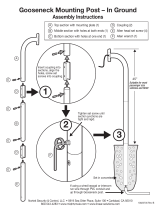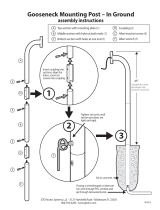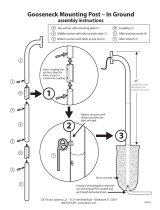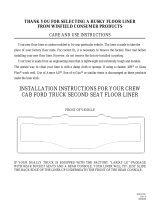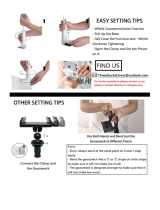Page is loading ...

MT-350W
COOL GRIP
Water-Cooled MIG Torch
INSTRUCTION MANUAL
F-15-449
June, 1998
Be sure this information reaches the operator.
You can get extra copies through your supplier.
Ready-to-Weld Torch Assemblies
Each of the following torches has a 45 degree gooseneck and
includes liner, contact tip and standard duty slide-on #10
nozzle.
MT-350W, .035, 12 ft. (3.6 m) ................................... 37014
MT-350W, .035, 15 ft. (4.5 m) ................................... 37015
MT-350W, .045-1/16, 12 ft. (3.6 m) ........................... 37016
MT-350W, .045-1/16, 15 ft. (4.5 m) ........................... 37017
These INSTRUCTIONS are for experienced operators. If you are not fully familiar with the principles of operation and safe
practices for arc welding equipment, we urge you to read our booklet, "Precautions and Safe Practices for Arc Welding, Cutting,
and Gouging," Form 52-529. Do NOT permit untrained persons to install, operate, or maintain this equipment. Do NOT attempt
to install or operate this equipment until you have read and fully understand these instructions. If you do not fully understand
these instructions, contact your supplier for further information. Be sure to read the Safety Precautions before installing or
operating this equipment.
Basic Torches
Basic torches do not include liners, contact tips or nozzles.
Mix and match the accessories listed in appropriate tables
to customize a torch that is just right for your job.
MT-350W, 12 ft. (3.6 m) ............................................ 37022
MT-350W, 15 ft. (4.5 m) ............................................ 37023

2
TABLE OF CONTENTS
1.0 INSTALLATION ........................................................................................ 5
1.1 INSTALLING TORCH TO WIRE FEEDER ........................................................................................ 5
2.0 MAINTENANCE ........................................................................................ 5
2.1 NOZZLE AND CONTACT TIP SYSTEMS ......................................................................................... 5
2.2 SWITCH REPLACEMENT ................................................................................................................ 5
2.3 GOOSENECK REPLACEMENT ....................................................................................................... 5
2.4 LINER REPLACEMENT .................................................................................................................... 6
2.5 POWER CABLE REPLACEMENT .................................................................................................... 7
3.0 EXPLODED VIEW AND PARTS LIST .................................................... 10
3.1 TORCH PARTS ............................................................................................................................... 10
3.2 EURO CONNECTOR PARTS .........................................................................................................11
3.3 NOZZLES ....................................................................................................................................... 12
3.4 CONTACT TIPS & TUBES .............................................................................................................. 12
3.5 LINERS ........................................................................................................................................... 12
3.6 MIG 4HD WATER KIT INSTALLATION ........................................................................................... 13
3.7 DIRECT TO CIRCULATOR INSTALLATION ................................................................................... 13
3.8 EURO ADAPTOR ASSEMBLY ........................................................................................................14
4.0 TECHNICAL DATA ................................................................................. 15
4.1 TORCH AMPERAGE RATINGS ...................................................................................................... 15
4.2 SPECIFICATIONS .......................................................................................................................... 15
5.0 - TROUBLESHOOTING............................................................................. 15
USER RESPONSIBILITY
This equipment will perform in conformity with the description thereof contained in this manual
and accompanying labels and/or inserts when installed, operated, maintained and repaired
in accordance with the instructions provided. This equipment must be checked periodically.
Malfunctioning equipment should not be used. Parts that are broken, missing, worn, dis-
torted or contaminated should be replaced immediately. Should such repair or replacement
become necessary, the manufacturer recommends that a telephone or written request for
service advice be made to the Authorized Distributor from whom purchased.
This equipment or any of its parts should not be altered without the prior written approval of
the manufacturer. The user of this equipment shall have the sole responsibility for any
malfunction which results from improper use, faulty maintenance, damage, improper repair
or alteration by anyone other than the manufacturer or a service facility designated by the
manufacturer.

3
WARNING: These Safety Precautions are for
your protection. They summarize precaution-
ary information from the references listed in
Additional Safety Information section. Before
performing any installation or operating procedures, be
sure to read and follow the safety precautions listed below
as well as all other manuals, material safety data sheets,
labels, etc. Failure to observe Safety Precautions can result
in injury or death.
PROTECT YOURSELF AND OTHERS
--
Some welding, cutting, and gouging
processes are noisy and require ear
protection. The arc, like the sun, emits
ultraviolet (UV) and other radiation and
can injure skin and eyes. Hot metal can cause burns.
Training in the proper use of the processes and equip-
ment is essential to prevent accidents. Therefore:
1. Always wear safety glasses with side shields in any work
area, even if welding helmets, face shields, and goggles
are also required.
2. Use a face shield fitted with the correct filter and cover
plates to protect your eyes, face, neck, and ears from
sparks and rays of the arc when operating or observing
operations. Warn bystanders not to watch the arc and
not to expose themselves to the rays of the electric-arc
or hot metal.
3. Wear flameproof gauntlet type gloves, heavy long-sleeve
shirt, cuffless trousers, high-topped shoes, and a weld-
ing helmet or cap for hair protection, to protect against
arc rays and hot sparks or hot metal. A flameproof apron
may also be desirable as protection against radiated
heat and sparks.
4. Hot sparks or metal can lodge in rolled up sleeves,
trouser cuffs, or pockets. Sleeves and collars should be
kept buttoned, and open pockets eliminated from the
front of clothing
5. Protect other personnel from arc rays and hot sparks
with a suitable non-flammable partition or curtains.
6. Use goggles over safety glasses when chipping slag or
grinding. Chipped slag may be hot and can fly far.
Bystanders should also wear goggles over safety glasses.
FIRES AND EXPLOSIONS -- Heat from
flames and arcs can start fires. Hot slag
or sparks can also cause fires and ex-
plosions. Therefore:
1. Remove all combustible materials well away from the
work area or cover the materials with a protective non-
flammable covering. Combustible materials include wood,
cloth, sawdust, liquid and gas fuels, solvents, paints and
coatings, paper, etc.
2. Hot sparks or hot metal can fall through cracks or
crevices in floors or wall openings and cause a hidden
smoldering fire or fires on the floor below. Make certain
that such openings are protected from hot sparks and
metal.“
3. Do not weld, cut or perform other hot work until the
workpiece has been completely cleaned so that there
are no substances on the workpiece which might pro-
duce flammable or toxic vapors. Do not do hot work on
closed containers. They may explode.
4. Have fire extinguishing equipment handy for instant use,
such as a garden hose, water pail, sand bucket, or
portable fire extinguisher. Be sure you are trained in its
use.
SAFETY PRECAUTIONS
11/95
5. Do not use equipment beyond its ratings. For example,
overloaded welding cable can overheat and create a fire
hazard.
6. After completing operations, inspect the work area to
make certain there are no hot sparks or hot metal which
could cause a later fire. Use fire watchers when neces-
sary.
7. For additional information, refer to NFPA Standard 51B,
"Fire Prevention in Use of Cutting and Welding Pro-
cesses", available from the National Fire Protection Asso-
ciation, Batterymarch Park, Quincy, MA 02269.
ELECTRICAL SHOCK -- Contact with live
electrical parts and ground can cause
severe injury or death. DO NOT use AC
welding current in damp areas, if move-
ment is confined, or if there is danger of
falling.
1. Be sure the power source frame (chassis) is connected
to the ground system of the input power.
2. Connect the workpiece to a good electrical ground.
3. Connect the work cable to the workpiece. A poor or
missing connection can expose you or others to a fatal
shock.
4. Use well-maintained equipment. Replace worn or dam-
aged cables.
5. Keep everything dry, including clothing, work area,
cables, torch/electrode holder, and power source.
6. Make sure that all parts of your body are insulated from
work and from ground.
7. Do not stand directly on metal or the earth while working
in tight quarters or a damp area; stand on dry boards or
an insulating platform and wear rubber-soled shoes.
8. Put on dry, hole-free gloves before turning on the power.
9. Turn off the power before removing your gloves.
10. Refer to ANSI/ASC Standard Z49.1 (listed on next
page) for specific grounding recommendations. Do not
mistake the work lead for a ground cable.
ELECTRIC AND MAGNETIC FIELDS —
May be dangerous. Electric current flow-
ing through any conductor causes lo-
calized Electric and Magnetic Fields
(EMF). Welding and cutting current cre-
ates EMF around welding cables and
welding machines. Therefore:
1. Welders having pacemakers should consult their physi-
cian before welding. EMF may interfere with some pace-
makers.
2. Exposure to EMF may have other health effects which are
unknown.
3. Welders should use the following procedures to minimize
exposure to EMF:
A. Route the electrode and work cables together. Secure
them with tape when possible.
B. Never coil the torch or work cable around your body.
C. Do not place your body between the torch and work
cables. Route cables on the same side of your body.
D. Connect the work cable to the workpiece as close as
possible to the area being welded.
E. Keep welding power source and cables as far away
from your body as possible.

4
FUMES AND GASES -- Fumes and
gases, can cause discomfort or harm,
particularly in confined spaces. Do
not breathe fumes and gases. Shield-
ing gases can cause asphyxiation.
Therefore:
1. Always provide adequate ventilation in the work area by
natural or mechanical means. Do not weld, cut, or gouge
on materials such as galvanized steel, stainless steel,
copper, zinc, lead, beryllium, or cadmium unless positive
mechanical ventilation is provided. Do not breathe fumes
from these materials.
2. Do not operate near degreasing and spraying opera-
tions. The heat or arc rays can react with chlorinated
hydrocarbon vapors to form phosgene, a highly toxic
gas, and other irritant gases.
3. If you develop momentary eye, nose, or throat irritation
while operating, this is an indication that ventilation is not
adequate. Stop work and take necessary steps to im-
prove ventilation in the work area. Do not continue to
operate if physical discomfort persists.
4. Refer to ANSI/ASC Standard Z49.1 (see listing below)
for specific ventilation recommendations.
CYLINDER HANDLING -- Cylinders, if
mishandled, can rupture and violently
release gas. Sudden rupture of cylin-
der, valve, or relief device can injure or
kill. Therefore:
1. Use the proper gas for the process and use the proper
pressure reducing regulator designed to operate from
the compressed gas cylinder. Do not use adaptors.
Maintain hoses and fittings in good condition. Follow
manufacturer's operating instructions for mounting regu-
lator to a compressed gas cylinder.
2. Always secure cylinders in an upright position by chain
or strap to suitable hand trucks, undercarriages, benches,
walls, post, or racks. Never secure cylinders to work
tables or fixtures where they may become part of an
electrical circuit.
3. When not in use, keep cylinder valves closed. Have
valve protection cap in place if regulator is not con-
nected. Secure and move cylinders by using suitable
hand trucks. Avoid rough handling of cylinders.
4. Locate cylinders away from heat, sparks, and flames.
Never strike an arc on a cylinder.
5. For additional information, refer to CGA Standard P-1,
"Precautions for Safe Handling of Compressed Gases in
Cylinders", which is available from Compressed Gas
Association, 1235 Jefferson Davis Highway, Arlington,
VA 22202.
EQUIPMENT MAINTENANCE -- Faulty or im-
properly maintained equipment can cause
injury or death. Therefore:
1. Always have qualified personnel perform the installa-
tion, troubleshooting, and maintenance work. Do not
perform any electrical work unless you are qualified to
perform such work.
2. Before performing any maintenance work inside a power
source, disconnect the power source from the incoming
electrical power.
3. Maintain cables, grounding wire, connections, power
cord, and power supply in safe working order. Do not
operate any equipment in faulty condition.
4. Do not abuse any equipment or accessories. Keep
equipment away from heat sources such as furnaces,
wet conditions such as water puddles, oil or grease,
corrosive atmospheres and inclement weather.
5. Keep all safety devices and cabinet covers in position
and in good repair.
6. Use equipment only for its intended purpose. Do not
modify it in any manner.
ADDITIONAL SAFETY INFORMATION -- For
more information on safe practices for elec-
tric arc welding and cutting equipment, ask
your supplier for a copy of "Precautions and
Safe Practices for Arc Welding, Cutting and
Gouging", Form 52-529.
The following publications, which are available from the
American Welding Society, 550 N.W. LeJuene Road, Mi-
ami, FL 33126, are recommended to you:
1. ANSI/ASC Z49.1 - "Safety in Welding and Cutting"
2. AWS C5.1 - "Recommended Practices for Plasma Arc
Welding"
3. AWS C5.2 - "Recommended Practices for Plasma Arc
Cutting"
4. AWS C5.3 - "Recommended Practices for Air Carbon Arc
Gouging and Cutting"
5. AWS C5.5 - "Recommended Practices for Gas Tungsten
Arc Welding“
6. AWS C5.6 - "Recommended Practices for Gas Metal Arc
Welding"“
7. AWS SP - "Safe Practices" - Reprint, Welding Handbook.
8. ANSI/AWS F4.1, "Recommended Safe Practices for
Welding and Cutting of Containers That Have Held
Hazardous Substances."
This symbol appearing throughout this manual
means Attention! Be Alert! Your safety is
involved.
The following definitions apply to DANGER, WARNING,
CAUTION found throughout this manual:
Used to call attention to immediate haz-
ards which, if not avoided, will result in
immediate, serious personal injury or loss
of life.
Used to call attention to potential haz-
ards which could result in personal injury
or loss of life.
Used to call attention to hazards which
could result in minor personal injury.

5
Removal
• Remove contact tip using pliers.
• Remove tip adaptor using 11/16 (18mm) wrench.
NOZZLE
CONTACT TIP
TIP ADAPTOR
HANDLE LOCK NUT
SWITCH
LEADS
SWITCH LEAD
CONNECTORS
GOOSENECK
HANDLE
LOCK NUT
WHITE CONDUIT LINE
FRONT HANDLE
1.0 - INSTALLATION
1.1 INSTALLING TORCH TO WIRE FEEDER
• Euro Connector
• Feed welding wire through female adaptor by hand and tighten drive rolls.
• Guide welding wire into the torch liner, carefully insert Euro connector into female adaptor and tighten Euro
hand nut.
2.0 MAINTENANCE
2.1 NOZZLE AND CONTACT TIP SYSTEMS
STEP #1
• Twist handle lock nut in direction of arrow.
• Pull handle lock nut away from handle.
• Remove switch from pocket in handle.
• Remove switch from switch lead connectors with
needle nose pliers.
• Push new switch lead connectors firmly onto
switch terminals with needle nose pliers.
• Fit new switch into pocket on handle, switch
leads must lie parallel.
• Reinstall handle lock nut on handle.
STEP #2
• Remove liner from torch (ref. pg. 6
Liner Replacement).
• Twist handle lock nut and pull
away from handle.
• Remove switch (ref. above
Switch Replacement).
• Slide handle back.
• Unthread power cable (red line).
• Remove clamps from water line
and conduit.
2.3 GOOSENECK REPLACEMENT
SWITCH
WATER LINES (RED & BLUE)
& POWER CABLE
OUTER
JACKET
2.2 SWITCH REPLACEMENT

6
• Thread power cable on and tighten.
• Push water line and conduit on all the way to base of fittings and crimp.
• Reposition Handle and Switch.
• Reinstall Handle Lock Nut.
2.0 - MAINTENANCE
2.3 GOOSENECK REPLACEMENT CONTD.
GOOSENECK
HANDLE LOCK NUT
BLUE WATER LINE
WHITE CONDUIT LINE
FRONT HANDLE
POWER/WATER LINE (RED )
STEP #2
2.4 LINER REPLACEMENT
• Remove nozzle, tip and tip adaptor and loosen liner set screw in Euro Connector using 5/64 Allen wrench.
• With torch straightened, grip conduit liner with pliers and remove.
STEP #1
5/64 (2 mm)
ALLEN WRENCH
LINER SET SCREW
STEP #2
• Feed liner through torch using
short strokes to avoid kinking.
Twist liner clockwise if necessary.
• Seat liner retainer with o-ring to
shoulder inside bore of Euro
Connector.
• Secure by tightening liner set
screw.
Do not overtighten.
5/64 (2 mm)
ALLEN WRENCH
LINER SET SCREW
EURO CONNECTOR
Ensure power source is off and torch is removed from feeder before proceeding.
LINER
RETAINER

7
2.0 - MAINTENANCE
2.4 LINER REPLACEMENT CONTD.
STEP #3
• Trim conduit liner to 5/8 (16 mm) stick out.
• Remove any burr that may obstruct wire feed,
especially on flat wire type conduit liner.
GOOSENECK
CONDUIT LINER
5/8 (16 mm)
2.5 POWER CABLE REPLACEMENT
STEP #1
• Remove liner (ref. Pg. 6).
• Remove nozzle, tip and tip adaptor.
• Remove housing screws.
5/64 (2 mm)
ALLEN WRENCH
LINER SET SCREW
HOUSING SCREWS
• Pull the rear housing up the torch cable approximately 1 ft. (300 mm)
• Unscrew power cable from rear Euro Connector body.
• Cut clamps off the water-in line (blue) and gas line (white).
• Pull gas and water line off of Euro body.
• Remove Euro Body from cable.
• Slide rear housing off torch.
WHITE CONDUIT LINE
EURO BODY
BLUE WATER LINE
POWER & WATER LINE
(RED WATER LINE)REAR HOUSING
STEP #2

8
2.0 - MAINTENANCE
2.5 POWER CABLE REPLACEMENT CONTD.
• Loosen handle lock-nut and remove switch (see Section 2.2).
• Slide handle back.
• Remove outer jacket by pulling outer jacket only from rear of torch.
All that remains are the inner hoses attached to the neck and switch lead wires.
• Unthread power cable from front of torch and replace with new one.
GOOSENECK
WHITE CONDUIT LINE
FRONT HANDLE
OUTER JACKET
WATER LINES (RED & BLUE)
& POWER LINE
STEP #3
STEP #4
WHITE CONDUIT LINE
GOOSENECK
USED POWER
CABLE (RED)
REPLACEMENT POWER CABLE (RED)
FRONT HANDLE
OUTER JACKET
• Tape hoses together at front and rear of torch.
• From rear of torch, slide front handle over hoses.
• Slide outer jacket over hoses from rear of torch.
STEP #5
GOOSENECK
LOCKNUT
TAPE
TAPE
HANDLE LOCK NUT
WHITE-IN LINE (BLUE)

9
STEP #6
2.0 - MAINTENANCE
2.5 POWER CABLE REPLACEMENT CONTD.
• Slide front handle up to neck, replace switch and secure with lock nut (see Section 2.2).
SWITCH LEAD
CONNECTORS
HANDLE
LEADS
SWITCH
LOCKNUT
GAS CONDUIT LINE
(WHITE)
POWER & WATER LINE
(RED WATER LINE)
STEP #7
BLUE WATER
LINE
EURO
BODY
• At rear of torch, slide rear housing over outer jacket.
• Attach rear Euro Body to power line.
• Attach the gas line and water line with new clamps and crimp to Euro Body.
REAR HOUSING
STEP #8
LINER SET SCREW
5/64 (2 mm)
ALLEN
WRENCH
• Slide rear handle over Euro Body and secure with mounting screws.
• Install liner (see Section 2.4).
LINER

10
3.0 - EXPLODED VIEW AND PARTS LIST
3.1 TORCH PARTS (WITH CABLE AND HOSES)
1
2
3
4
6
5
15
12
13
11
14
16
8
7
10
9
ITEM PART NO. DESCRIPTION
1 See Table 3.3 NOZZLE
2 See Table 3.4 TIP OR TUBE
3 37048 TIP ADAPTER
(Incls. 952634, 952635)
952634 O-RING TIP ADAPTOR (5)
952635 RETAINING RING (5)
4 952633 SHOCK WASHER (2)
5 952667 HANDLE LOCKNUT (2)
6 37029 GOOSENECK - 45°
(Incls. 952670, 952671)
7 *952640 12 FT INTERNAL WATER LINE (BLUE)
(Incls. 2 PC- 952642)
952641 15 FT INTERNAL WATER LINE (BLUE)
(Incls. 2 PC - 952642)
8 952670 FRONT WATER LINE CLAMP (5)
9 952671 FRONT CONDUIT CLAMP (5)
10 *952672 12 FT CONDUIT (WHITE)
952673 15 FT CONDUIT (WHITE)
11 952668 FRONT HANDLE
12 952674 12 FT POWER CABLE (RED)
952675 15 FT POWER CABLE (RED)
13 *952656 SWITCH LEAD CONNECTORS (4)
14 *952676 12 FT CONTROL WIRE (2)
952677 15 FT CONTROL WIRE (2)
15 952669 SWITCH
16 *952678 12 FT OUTER JACKET
952679 15 FT OUTER JACKET
* On part number denotes non-stock item, allow 2-3 weeks for delivery.
(X) At end of description denotes package qty.

11
3.0 - EXPLODED VIEW AND PARTS LIST
3.2 EURO CONNECTOR PARTS
18
21
20
24
25
22
17
17
19
ITEM PART NO. DESCRIPTION
17 *952646 REAR CONDUIT CLAMP (12)
18 *952642 REAR WATER LINE CLAMP (6)
19 952643 EURO WATER FITTING
20 *952660 EURO-HOUSING WITH STRAIN RELIEF
21 CONDUIT LINER, (See Table-3.5)
22 952647 RED WATER LINE
(Incls. 2 PC-952646)
23 952648 BLUE WATER LINE
(Incls. 2 PC-952646)
24 *952663 EURO-CONNECTOR BODY WITH RETAINING RING
*952665 CONTROL PIN WITH INSULATOR (10)
952666 O-RING, EURO GAS INLET (5)
25 952659 EURO-ADAPTER COMPLETE
*952664 HAND NUT (2)
*952661 HOUSING BAND (2)
*952662 MOUNTING SCREW (10)
* On part number denotes non-stock item, allow 2-3 weeks for delivery.
(X) At end of description denotes package qty.
23
25

12
3.0 - EXPLODED VIEW AND PARTS LIST
3.3 NOZZLES
Gas Nozzles
Nozzle
I.D.
#8 1/2-in. (13 mm) 37045
#10 5/8-in. (16 mm) 37046
#12 3/4-in. (20 mm) 37047
Slide-on, Self-Insulated Type Gas Nozzle
3.4 CONTACT TIPS AND TUBES
Contact Tips & Tubes
Contact Tip Contact I.D.
Short Long Tube*** Diameter
Wire Type & Size Part No. Part No. Part No. in. (mm)
Hard, Cored & Soft Wires
.030 in. (0.8 mm) 632791 20123 - .037*
.035 in. (0.9 mm) 632793 632794 996104 .043*
.040 in. (1.0 mm) 37275** 37276** 37277** .048*
3/64/045 in. (1.2 mm) 632795 632796 996105 .061
.045 in. (1.2 mm) 37278** 37279** 37280** .054*
.052 in. (1.4 mm) 632795 632796 996816 .062
1/16 in. (1.6 mm) 37281** 37282** 37283** .072
1/16 in. (1.6 mm) 632797 632798 996106 .078*
*** Requires Collet Nut (P/N 632811)
** Available 2nd Quarter 1998
* Recommended for Aluminum
3.5 LINERS
Liners for MT-350W, 450W & 650W (12 & 15 ft.)
Wire Size
Hard Wires
.030 (0.8 mm) ................................................................ 37031
.035 (0.9 mm) ................................................................ 37032
.045-1/16 (1.2-1.6 mm) ................................................. 37033
Soft Wires
.035 (0.9 mm) ................................................................ 37039
3/64-1/16 (1.2-1.6 mm) ................................................. 37040
Long Tip
Short Tip
Tube***
Collet Nut
632811

13
3.0 - EXPLODED VIEW AND PARTS LIST
3.6 Typical Set-Up
When using Mig 4HD Water Kit 37303
WC-8C Coolant Circulator - Vertical design to fit in cylinder rack of
most power source trucks. High efficiency fan cooled radiator dissi-
pates 6480 BTU/hour ........................................................33739
3.7 Typical Set-Up
When connecting torch directly to coolant circulator (2 of each part required)
Options & Accessories
Water Kit for Mig 4HD - Kit consist of inlet/outlet fittings, mounting
hardware, 8 ft. (2.4 m) water hoses with B size water fittings and
mounting hardware ............................................................. 37303
Optional Water Fittings and Connectors - The following items
can be used to connect the MT-350W, 450W and 650W to any
water circulator having 5/8 B size connectors:
Quick Disconnect Fittings - Two required - one fitting for
each circulator water hose to torch water hose connection or
connect torch directly to the water circulator ........ 23610853
Water Hose Coupling - One required for each quick discon-
nect fitting to water hose connection .......................... 11N18
Water Hoses - Two required - one for water supply to the
torch and one for return to the water circulator. Use hose cou-
pling (11N18) for connecting water hoses together. See Table
above.
Water Hose (3 ft.) 20634
Water Hose (6 ft.) 20633
Water Hose (12 ft.) 40V76
Water Hose (25 ft.) 406196
Water Coupler
11N18
Quick Disconnect
Fitting
23610853
Gun Water
Connection
included with
torch

14
3.0 - EXPLODED VIEW AND PARTS LIST
3.8 WIRE FEEDER CONNECTOR ASSEMBLY
(MIG-35, DIGIMIG) - 20572
SETSCREW - 19318
ADAPTOR INSULATOR - 19316
ADAPTOR BLOCK - 19315
(To Torch Euro Connector)
SETSCREW - 19319
POWERLUG - 19314
ADAPTOR PLUG - 19312
(To Wire Feeder)
(2) FEMALE CONN. W/LEAD - 19317
POWER CABLE - 19339
SWITCHCORD - 19340
Includes PLUG - 2062336
Supplied:
SUPPORT LINER - 19309
GAS HOSE
(Supplied w/19315)

15
5.0 - TROUBLESHOOTING
4.0 - TECHNICAL DATA
4.1 TORCH AMPERAGE RATINGS
NOTE: Ratings are based on tests that comply with NEMA ARC Welding Section Standard 11-6-1975 for Duty Cycle. The time period of
one complete cycle shall be 10 minutes (60% = 6 minutes). National Electrical Manufacturers Association, 2101 L Street N.W.
Washington D.C. 20037.
PROBLEM POSSIBLE CAUSE
Poor Wire Feed • conduit liner clogged or kinked
• incorrect liner size or contact tip
• liner cut too short and not seating properly in tip adaptor
• drive rolls too tight resulting in scoring of welding wire
• welding wire dirty, rusty or too much cast
Short Tip Life • drive rolls too tight resulting in scoring of welding wire
• welding wire dirty, rusty or too much cast
• uncoated wire being used, increasing usage
• wrong tip size
• torch being run beyond its amperage range
Torch Overheating • loose retaining screw on quick connect block
• insufficient gauge power cable and/or ground cable
• loose connector cones and/or cone nuts
• torch being run beyond its amperage range
• electrical malfunction in power source
• poor or no water flow
Weld Porosity • spatter built up in nozzle blocking gas
• leaks in gas hose or improper connection
• o-rings on power pin are cut or damaged
• inner tube loose from connector cone
• poor wire feed (see above)
• improper shielding gas or welding wire
• rusty or poor quality welding wire
• parent metal rusty or contaminated or high in sulphur content
• gas flow improperly set
Torch Leaking • Power cable burnt
• Leak in gooseneck
4.2 SPECIFICATIONS
Model MT-350W
Length ........................................... 13.6 in (345 mm)
Height ............................................. 4.3 in. (109 mm)
Handle Dilameter .............................. 1.4 in. (36 mm)
Weight .......................................... 19.5 oz. (553 gm)
(less service lines)
Water Cooling Requirement: 0.5 Gal./Min. (2 L./Min.)
100% DUTY CYCLE 60% DUTY CYCLE
CO2 MIXED CO2 MIXED
350 AMP 350 275 400 325

F-15-449 6/98
IF YOU DO NOT KNOW WHOM TO CALL
Telephone: (800) ESAB-123/ Fax: (803) 664-4452/Web: http://www.esab.com
Hours: 7:30 AM to 5:00 PM EST
ESAB Welding & Cutting Products, Florence, SC Welding Equipment
COMMUNICATIONS GUIDE - CUSTOMER SERVICES
A. CUSTOMER SERVICE QUESTIONS: Telephone (803) 664-5540/Fax: (800) 634-7548
Order Entry Product Availability Pricing Hours: 8:30 AM to 5:00 PM EST
Order Changes Saleable Goods Returns Delivery
Shipping Information
B. ENGINEERING SERVICE: Telephone: (803) 664-4416 / Fax : (800) 446-5693
Welding Equipment Troubleshooting Hours: 7:30 AM to 5:00 PM EST
Warranty Returns Authorized Repair Stations
C. TECHNICAL SERVICE: Telephone: (800) ESAB-123/ Fax: (803) 664-4452
Part Numbers Technical Applications Hours: 8:00 AM to 5:00 PM EST
Performance Features Technical Specifications Equipment Recommendations
D. LITERATURE REQUESTS: Telephone: (803) 664-5501 / Fax: (803) 664-5548
Hours: 7:30 AM to 4:00 PM EST
E. WELDING EQUIPMENT REPAIRS: Telephone: (803) 664-4469 / Fax: (803) 664-5557
Repair Estimates Repair Status Hours: 7:30 AM to 3:30 PM EST
F. WELDING EQUIPMENT TRAINING:
Telephone: (803)664-4428 / Fax: (803) 664-4476
Training School Information and Registrations Hours: 7:30 AM to 4:00 PM EST
G. WELDING PROCESS ASSISTANCE:
Telephone: (803) 664-4248 / Fax: (803) 664-4454 Hours: 7:30 AM to 4:00 PM EST
H. TECHNICAL ASST. CONSUMABLES:
Telephone: (800) 934-9353 Hours: 7:30 AM to 5:00 PM EST
/
